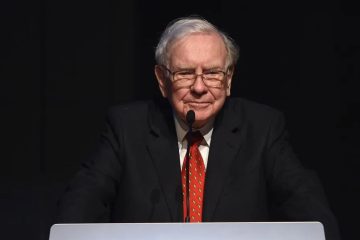Why Options (and Options Traders) are Good for the Market
A few nights ago I was lucky enough to share a dinner with an old friend, a cardiologist.
As we enjoyed a few miniature Italian pastries and coffee to end our evening, my friend shifted the conversation toward, of all things, options …
“James, I’ve been following your recommendations the last several months, and I’ve noticed you use options strategies quite often. I’ve always thought buying and selling options amounted to pure gambling. So tell me … are options good for the financial markets?”
I found this a surprising question from a man who seems fearless — someone experienced at saving lives and helping people to manage and improve their condition.
The only difference is that he is skilled at matters involving physical health, while he’s a bit more skeptical at the best ways to navigate his financial health.
I know he’s not the only one.
But, when you think about it, our paths aren’t so different after all …
Secret Weapon vs. WMD
You know, I told my friend, there’s no doubt options can be weapons of mass destruction when used by a novice. Or, for that matter, an expert.
After all Barings Bank, a 233-year old institution that helped finance the Napoleonic Wars, was brought down single-handedly in 2005 by an experienced professional options trader, Nick Leeson.
This rogue institutional trader lost $ 1.3 billon as a result of a series of risky options trades.
In fairness to the options trader, he was at-least aiming high!
He was trying to turn the $ 1.3 billion into $ 27 billon when, out of nowhere, a Japanese earthquake rocked the financial markets around the world and literally wiped him and his firm out.
It may have been the worst options trading wipeout in human history. But I’ve seen options traders (of all experience levels) throw all caution to the wind, morph into pure gamblers and — in more cases than I care to remember — wipe out.
Having Options is Better Than
Not Having Them. Here’s Why
Now, I’m not telling this to spook you or deter you from trading options.
I do incorporate options in my trading and even my investing services, because there are speculative as well as conservative strategies. And, I believe, there’s a place for both in everyone’s account.
No matter whether you’re a pro or thinking about adding options to your overall strategy, I want you to realize that it’s just as easy to make bad choices as it is to make good ones.
I went on to explain …
Despite some scary stories, the fact remains that options were created out of economic necessity, and are a logical extension of a well-developed financial market.
2 Ways the Options Market
Can Directly Benefit You
Assume that there were no options and only stocks.
Say you want to buy shares of ABC stock, trading for $ 50, and you’re a longer-term investor — none of this short-term speculative stuff for you!
- When you decide to purchase shares for your long-term hold, what’s better for you, one seller or two? Obviously, two sellers are better, as they will compete for your business and help to lower your purchase price.
- Likewise, when you sell your stock, would you prefer one buyer or two? Again, you should prefer two, as they will compete for your business and help to raise your selling price.
In other words: The more market participants you have, the better off you are, whether buying or selling. And the options market is good at attracting more participation!
Better Prices for You Means
Better Trading Action Overall
The more buyers and sellers, the narrower the bid-ask spreads become, which causes more stock to transact.
The spreads narrow because, when more buyers compete by raising their bid price, this provides incentive for sellers to enter the market.
In turn, the sellers will compete by lowering the asking price (giving incentive for buyers to enter the market).
The financial markets always benefit from narrow spreads.
Show Me the Math!
You likely remember Cuba Gooding Jr.’s “show me the money!” quote from “Jerry Maguire.”
Well, if you’re managing your own money, you make your real decisions to invest when the math makes sense.
And so, I pulled my iPhone out and showed my friend the following diagram that shows how the bid-ask spreads (red-dotted line) cause fewer shares to be sold (in this case, 122,000 instead of 128,000) when compared to no spread (solid blue line).

Now, back to buying your ABC stock. At this time there is only one seller, who also is a long-term player and has held this stock for 10 years.
Notice the nice, neat, clean market we have here with no speculators. However, with only one seller, this is certainly not a good situation for you.
Enter ‘Sam the Speculator’
Now let’s meet Sam Speculator. Sam likes to speculate on market direction. He’s willing to take big risks and gamble for big profits. Longer-term investing for him is measured in hours.
He just happens to think ABC stock will fall a few points. He would short the shares (which would be good for you, since you’d have another seller), but he’s very afraid to because of the recent volatility in ABC.
Sam doesn’t want to take the risk of the stock moving higher. So he sits on the sidelines, leaving you with just the one seller.
Now let’s consider the options market …
Call options give market participants a way to purchase stock, while put options provide a way to sell stock for a fraction of the cost of the stock.
In addition, the owner of a call or put option has risk that is limited to the amount paid for the option. This idea gets Sam’s attention. He puts in a bid to buy 10 of the $ 50-strike puts for a price of $ 5.50 per share.
That’s $ 550 per option contract, because one contract generally represents 100 shares of the underlying stock, ETF or index it represents. So if he buys 10 contracts, he’s spending $ 5,500 to control 1,000 shares of ABC stock.
And because he’s buying puts, he’s betting on a downward move, without taking on all the risk of shorting shares outright.
Here’s Where Things Get Interesting
The market-maker sees this order and wants to fill it, because this is how he makes money. He will create a synthetic put by selling (shorting) stock and buying a call at the same time.
In other words, the market-maker must “manufacture” the long put option Sam wants.
But where will the market-maker be able to buy the call? He doesn’t know either, so he puts in a bid to buy one for, say, $ 5.25.
Maybe This is You
Another investor, Conservative Connie, also hates the idea of speculation in the markets. However, she will gladly sell someone a call option against stock in her IRA account, as it will give her income without the need for selling her shares.
She happens to own ABC stock, so she sells the market-maker the call and pockets the $ 5.25 per share. She’s willing to assume the downside risk on ABC. (If she wasn’t, she wouldn’t own it.)
Connie doesn’t think the stock will fall; Sam thinks it will. Regardless of the outcome, together they bring more stock to the market.
Notice what’s happened.
- The market-maker shorts stock, which is really what Sam wanted to do but was afraid of the risk.
- The market-maker then protected himself with the purchase of a call and sold that package (a synthetic put) as a long put to Sam.
- You wanted to buy shares of ABC but now have two sellers instead of one.
The market maker, in essence, has partitioned his risk between two other players. Together, Sam and Connie hold the synthetic short position (Sam is long the “put” and Connie is short the call).
Because those two participants were willing to accept the associated risks, the market-maker was able to short the stock … thus lowering the asking price of the stock you’re interested in buying!
The Lesson: The Market Needs
Speculators (and So Do You)
Options, in this example, gave us an arena in which to meet speculators. It doesn’t matter where they live or what they want to use the option for.
In this example, Connie was willing to assume the downside risk of the stock if she could get paid for it. Sam was willing to pay for that.
Unfortunately, Sam doesn’t know Connie. But, through the options market, Sam and Connie are matched.
Ultimately, the options markets brings in more participants, making the spreads narrower for all. So speculators are actually a necessary part of financial markets.
Although it’s sometimes difficult to see, these “specs” make the markets better and more-efficient.
If You’re Still Not Convinced,
Think About the Bond Market.
Bonds are almost always associated with conservative investing. If you buy a bond, you may see yourself as a responsible, conservative investor.
In fact, you may even hate the idea of borrowing! No credit cards or debts of any kind for you.
Now for the hidden truth.
Who do you think is on the other side of that bond trade? It’s a borrower— or speculator — hoping to make a profit by earning more with the borrowed funds than he or she will owe in interest.
If you love the idea of loaning money, be glad there are speculators in the world. Simply put: No speculators, no bond market.
Speculators are an essential part of any well-functioning market. While it is a tragedy that Nick Leeson single-handedly brought down Barings Bank with his all-or-none option strategy, one fact remains.
When an options trade goes bad, it’s always the fault of the user and not of the options market.
2 Sides to Every Market
Don’t forget there were also investors on the other side of those trades, and for every option trade there is a winner for every loser, as showed my dinner companion, in the following chart:

Notice how the profit and loss diagrams are mirror images for the long and short positions.
Money merely changes hands from one person to the other. In this way, options can be viewed as a “bet” between two people, but that should not trick you into believing that’s why they were created.
Somewhere in the world, a conservative mutual fund manager may have desired puts as a hedge for his mutual fund, and bought the puts that Nick was selling.
Options are about transferring risk.
Nick Leeson was selling straddles on a Japanese index speculating on the market moving higher; he was accepting the risk the mutual fund manager wanted to hedge.
In the straddle strategy, one individual (or firm) is buying a call option and also buying a put option with the same expiration month and strike price. What many straddle buyers hope, then, is to make more on the winning leg of the trade, than they lose on the losing side.
Because of this, that mutual fund may have had a great year and provided for a new home for someone or protected their IRA account. The fund may have sent someone to college who, otherwise, never would have had a chance.
But we will never know the name of this person as we know Nick Leeson’s. We will never know, because that is not horrific news, so it just vanishes into the background.
It’s easy to overlook what you cannot see. But they are there every time another loses on an option trade.
As I picked up the check, I leaned over to my friend and said …
Options are good for the market. They create narrower spreads and provide excellent hedges for conservative investors. They are also excellent speculating tools for those who take the time to study and learn how to use them responsibly.
The good news is, you don’t have to have a degree in finance to use them. They are available to everyone who wants to use them. So if you are using options, use them wisely.
And if you’re not using them, that’s OK too. But if you’ve ever gotten a great price on a stock, you may want to thank an option trader for that!
Watching Your Chickens,
James DiGeorgia








